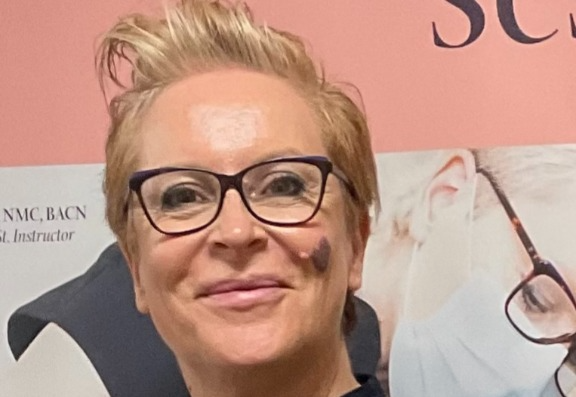From the outside in.
Your skin is the reflection of the outside world of what is going on inside you. Both physically and emotionally.
STRESS, we band that word around a lot in this day and age, we know it is bad for our health and we also know that stress affects your skin, it can age you, it can dry you out, make you break out, it can make you lose your hair. These are all symptoms of stress; your skin is trying to tell you to address the source of your stress before you become ill.
Why is it important to address these issues?
The skin is your largest organ, and it not only reflects what is happening on your insides, but it is your primary barrier against infection and the frontline of your immune system. Your skin function as part of your immune system relies on your skin remaining in the best condition possible.
If you are stressed and run down and your skin starts to show signs of stress weakening and breaking, this weakens the immune function, and you are more susceptible not just to premature ageing but to picking up all the bugs.

Looking after your skin is not vain.
For this reason, aesthetic treatments such as the use of peels, polynucleotides, radio frequency, hyaluronic acid fillers, skin boosters and LED light treatments are important in maintaining your skin’s ability to protect you.
These aesthetic treatments rehydrate your skin on many levels. They can stimulate collagen production, essential for your skin’s strength and elasticity.
The new regenerative treatments, such as polynucleotides can enable your body to regenerate new skin cells. Other treatments promote healing and reduce inflammation. Treating the skin will relieve the results of stress on the skin but we need to look deeper to treat the source.
What is going on under the skin?
Cortisol is a hormone, and it normally fluctuates during the 24 hours of the day as part of your sleep-wake cycle. It is naturally a little higher just before you wake and is designed to reduce during the day. However, if you are emotionally under pressure or physically you can continue to release cortisol with it reaching higher than normal levels and staying there. This triggers inflammation in your body affecting all your systems, reducing your libido causing erectile dysfunction, and it wreaks havoc with your skin. It also interferes with insulin your ‘master’ hormone which promotes weight gain, and together they store fat on your tummy.
It is not just emotional stress; you can stress your body with both zero exercises and over-exercise as well as overeating and extremely calorie-reduced diets.
The role of the gut.
The gut microbiome is being recognised now for the significant role it plays in your entire body. The gut microbiome is made up of more cells than you have in your body and weighs the same as your brain. The microbiome is fighting to keep your body working as well as it can 24 hours a day. We now know this is where most of your serotonin is produced and stored ready for release.
Serotonin is a key hormone responsible for your mood balance. This is part of what is known as the gut-brain axis. The gut and the brain communicate with each other to support your body systems.
Cortisol inhibits serotonin production as does alcohol, which also destroys your stores of serotonin in the gut which evidence shows is why you get the ‘beer fear’ with a hangover.
The gut microbiome also plays a huge role in your skin health. This is known as the gut-skin axis. When it is disrupted by high cortisol, high alcohol or elevated levels of ultra-processed food, the gut barrier becomes weakened, and the number of good gut bacteria is taken over by bad gut bacteria. These can access your blood system through your weakened gut wall. Visible signs of this happening in the skin include susceptibility to sun damage and premature ageing, breakouts, acne, rosacea, psoriasis, and eczema. Research has shown that treating these conditions by focusing on the gut has fantastic results.
How to fix this?
Start on the inside.
There are several things you can do to reduce your cortisol levels. The first one is to manage the source of your stress.
That is not always simple.
So, you need to protect yourself as much as possible. To do that the key thing is to sleep, ensure you go to bed at the same time every night as much as possible, your body loves a routine.

Cut all the manufactured processed food from your diet. Anything that comes in a packet, and yes that includes all those foods that claim to be healthy are not.
Eat a varied natural colourful diet including fresh food and fermented food with plenty of fibre and the addition of probiotics to help boost your good gut bacteria.
Try and leave at least 12 hours between the last thing you eat at night and the first thing you eat the next day. This allows your gut and your body to reset.
Do not starve yourself!
Reduce your alcohol. The odd glass of wine or beer is fine, but if you have noticed you are drinking every night as a habit to relax and unwind, swap that for a 10-minute walk, yes just 10 minutes and just a walk.
Cold water therapy is excellent for reducing stress. A daily cold shower or a swim in the sea is known to reduce your stress and increase your resilience. It is also fantastic for your skin health.
Have more sex if you can. This is a great natural way to reduce your cortisol levels.
What about your sex hormones?
Both men and women experience a drop in sex hormones triggering menopause for women and andropause for men. Both sexes experience low mood, higher anxiety and irritability, lack of motivation, and reduced libido. Men may experience erectile dysfunction, women may experience pain during sex, urinary incontinence, vaginal atrophy, and dryness. Oestrogen counteracts the effect of cortisol, so in menopause, as oestrogen drops higher levels of cortisol circulating in the body and this can trigger anxiety and depression.
In men, elevated levels of cortisol can block your body’s response to testosterone.
How can you tell?
To be 100% sure a blood test or something called a Dutch test to check your hormone levels including cortisol. With this information, you can look at options to rebalance your hormones including hormone replacement to rebalance your hormones.
Your body is a fabulous finely-tuned machine that is constantly battling to keep you in the best possible shape. Over time, too often we stop listening to our bodies and avoid treating the root cause of issues that present as changes in our mood, weight, skin, and sexual function.
If you only treat the surface issues such as poor skin health, the issues will continue which is why I promote an integrated approach to all treatments.
If you want to read more, the experts at Consulting Room really know what they're talking about and have put together some Menopause FAQs just for you.
If you have more questions, you can use the Menopause questions feature to talk to our panel of trained medical experts.
If you're keen to get started with any of these treatments right away then you're in luck - those clever folks also have a list of trusted, accredited Menopause clinics in your area.
Many thanks to the author of this blog Piroska Cavell who founded Clinic Sese who are specialist in advanced anti-ageing aesthetics, wellbeing, weight-loss and women’s health based in Margate.
Piroska’s unique career path, a combination of both creative and medical roles – from beauty therapist to makeover artist, from midwife to advanced aesthetic practitioner – has developed her expert eye for aesthetic artistry and an empathetic understanding of the anxieties and drivers within each self.
Call Piroska and the team at Clinic Sese now on 0739 504 6957 or visit clinicsese.com.

A survey reveals that most people trust dermatologists far more than social media influencers, yet many continue to spend money on treatments that don’t work.
Belotero vs. Juvederm: They are two of the most popular fillers for lip augmentation, but which is the right one for you?
Croma’s latest range brings professional in-clinic results into your everyday routine. Clean, vegan, and packed with powerhouse ingredients, these products are designed to hydrate, brighten, protect, and fight early signs of ageing.
Hey, wait!
Before you go.....
Let's stay in touch, pop your details here and we'll send our editor's hand-picked updates on your fave subjects.